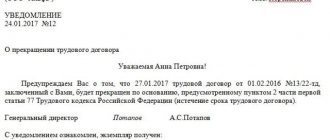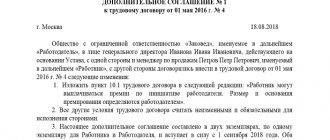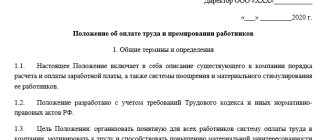Where, according to the Labor Code, does the employer establish the procedure for awarding bonuses and depriving them of bonuses?
The Labor Code allows you to set an employee’s salary, making it up of several parts (Article 129):
- payment for the work itself;
- additional payments for special working conditions;
- incentive payments, among which bonuses usually play a leading role.
If the first 2 parts are sufficiently regulated by law, then with regard to establishing bonus rules, the employer can act independently (Article 135 of the Labor Code of the Russian Federation), determining at its discretion:
- quantity, types and, accordingly, a specific list of bonuses paid;
- the frequency of their accrual and the circle of employees who will be entitled to one or another type of bonus;
- a list of those indicators, the fulfillment of which entails the emergence of the right to receive a bonus;
- a system for assessing the value of each type of bonus, the procedure for considering the results of this assessment and a procedure that allows an employee to challenge these results;
- grounds that serve as a reason for depriving an employee of a bonus.
Attention! Hint from ConsultantPlus It will not be a violation if you give an employee a one-time bonus for special work achievements, even if a special bonus procedure is not provided. This is your right... (read more about rewarding employees with money in K+). Trial access to K+ is free.
The Labor Code of the Russian Federation does not contain any restrictions for establishing bonus rules, obliging the employer only to:
- enshrine them in an internal regulatory act, without prohibiting the use of an employment agreement with a specific employee as such an act;
- coordinate the content of this act with representatives of the labor collective, and for state unitary enterprises and municipal unitary enterprises - with uniform recommendations developed by the Russian tripartite commission (consisting of representatives of the Government of the Russian Federation, trade unions and employers) on the regulation of social and labor relations;
- not to worsen the terms of remuneration of a particular employee in comparison with the developed normative act, and the conditions of this act - in comparison with the norms of labor law;
- familiarize each employee with the rules for bonuses against receipt.
Thus, establishing a procedure for depriving an employee of a bonus under the Labor Code of the Russian Federation means enshrining the rules of this procedure in the internal regulatory act on bonuses.
For information about which documents may establish bonus rules, read the materials: “The procedure for paying bonuses under the Labor Code of the Russian Federation” and “Accruing bonuses to an employee in different situations .
The article “Calculation of the quarterly bonus for actual time worked” will tell you how to calculate the bonus for the time actually worked and the peculiarities of its taxation.
How bonuses are included in wages
You can include a bonus in the list of payments that make up the remuneration system on the basis of Articles 129 and 135 of the Labor Code of the Russian Federation.
As a general rule, bonuses are not guaranteed and unconditional payments. The employer has the right, but is not obligated, to pay them.
Bonuses are most often tied not only to the achievements of specific employees, but also to the economic results of the company as a whole. For example, to the plan for turnover, the number of attracted clients, profit indicators, and so on. This allows the employer not to pay bonuses if difficult times come.
The payment of bonuses must be fixed in the local documents of the company: Regulations on remuneration, collective agreement or employment contract, or Regulations on bonuses.
If the employment contract or local regulations of the company do not directly state that the bonus is mandatory, its payment to the employee is not guaranteed
Grounds for deprivation of bonuses - why are bonuses deprived at work?
What can you deprive of a bonus for? There are many reasons for non-payment of premiums. The reasons most often indicated in a regulatory act are:
- whether the employee has received a disciplinary sanction during the bonus period;
- the presence of a disciplinary offense during the bonus period (regardless of whether it entailed disciplinary action);
- dismissal during the bonus period;
- bonus period not fully worked out.
In addition, deprivation of a bonus can be carried out by decision of the manager, the right to which:
- or is enshrined in the internal regulatory act on bonuses as one or the only reason for non-payment of bonuses;
- or appears if the normative act on bonuses does not contain a description of the procedure for depriving the bonus.
The employer's participation in the reduction of bonuses for the reasons listed in the normative act can also be expressed in the fact that it determines what part of the total bonus amount the employee is deprived of the bonus.
Payment of bonuses on non-working days introduced due to coronavirus
In accordance with the Decrees of the President of the Russian Federation, during non-working days, wages must be paid in full. The amount of wages must be equal to the amount that the employee would be paid for fully worked hours or for fulfilling the norm with piecework wages.
The company is obliged to accrue and pay bonuses to employees for non-working days due to the epidemic only if the company documents establish that the bonus is paid constantly and unconditionally.
If the bonus is included in the wage system as a monthly and mandatory payment
, then for the period of non-working days - April-May 2021 - the company is obliged to pay a bonus.
If the bonus is tied to performance
work, the company has the right not to pay a bonus if any of the indicators are not met.
Is deprivation of a bonus a disciplinary sanction or not?
Is deprivation of a bonus a disciplinary sanction? In no case! The list of disciplinary sanctions is strictly defined by Art. 192 of the Labor Code of the Russian Federation - and deprivation of bonuses is not among them.
What types of disciplinary sanctions are there and how they are applied to employees, read the material “Types of disciplinary sanctions under the Labor Code of the Russian Federation.”
At the same time, a direct connection between disciplinary action and deprivation of bonuses, as a rule, exists, since the presence of this penalty among the reasons why an employee loses the right to bonuses occupies a leading position. However, a certain sequence must always be followed: first, a disciplinary sanction for an offense, and then the deprivation of a bonus due to the presence of this sanction.
Imposing a disciplinary sanction is a right, not an obligation of the employer (Article 22 of the Labor Code of the Russian Federation), that is, having considered the circumstances of the offense, he may not punish the employee. Then, in a situation where the manager makes a decision not to apply a disciplinary sanction for an offense committed, and an internal regulatory act provides for the deprivation of a bonus precisely for the presence of a penalty, the employee cannot be deprived of bonuses. But if a disciplinary offense is specified as a basis for deprivation of a bonus, then regardless of whether punishment follows, the employee will be left without a bonus.
A disciplinary offense and a disciplinary sanction are formalized according to certain rules that must be strictly observed so that the employee cannot challenge the established fact of the misconduct and the legality of the penalty and, accordingly, cannot claim that the deprivation of a bonus was unlawful on any of these grounds.
Is it possible to deprive a bonus for disciplinary violations?
Is it possible to deprive employees of bonuses for being late, refusing to go on a business trip, or other disciplinary offenses?
According to Art. 192 of the Labor Code of the Russian Federation for committing a disciplinary offense, that is, for non-fulfillment or improper performance by an employee through his fault of the labor duties assigned to him, the employer has the right to apply the following disciplinary sanctions to him: 1) reprimand; 2) reprimand; 3) dismissal for appropriate reasons.
By virtue of this article:
the application of disciplinary sanctions not provided for by federal laws, charters and regulations on discipline is not permitted; When imposing a disciplinary sanction, the severity of the offense committed and the circumstances under which it was committed must be taken into account.
The procedure for applying disciplinary sanctions is prescribed in Art.
193 Labor Code of the Russian Federation. However, non-awarding (reducing the size) of a bonus is another measure of influence on the employee and does not apply to disciplinary sanctions. This means that in this case the procedure for applying disciplinary sanctions established in Art. 193 of the Labor Code of the Russian Federation, does not apply.
Since the bonus system is regulated by local regulations of the organization, the corresponding grounds must be specified in these acts. In particular, they can include a provision that if there are delays, the employee is completely deprived of the bonus or the bonus is calculated using a reduction factor. The legislation does not establish either options for reducing premiums or limits for their reduction.
So, deprivation of an employee’s bonus is not part of the disciplinary sanctions provided for by the legislation of the Russian Federation. At the same time, deprivation of a bonus in this situation is possible: if an employee does not fulfill his job duties in good faith, the employer has the right not to pay him a bonus. In this case, it is necessary to provide in a local regulatory act (for example, in the regulation on bonuses) or in a collective agreement the corresponding condition for depreciation.
What to do if bonuses were deprived without reading the order?
Can an employer deprive a bonus without an order? Yes it is possible. In a situation where, in the internal regulatory act on bonuses, which the employee was promptly familiarized with on receipt, one of the reasons for deprivation of a bonus is the reason why he was not accrued a bonus for the corresponding period, there is no need to draw up a separate order. In this case, the reason must be documented - the basis for not accruing the bonus. An employee who does not agree with the fact that he was deprived of a bonus will have to challenge not the reason for its non-accrual, but the legality of the basis on which the deprivation became possible.
The presence of an order to reduce bonuses becomes mandatory when the decision not to pay a bonus to an employee is made by the employer. This is possible in the following situations:
- when the basis for deprivation of a bonus is not in the list given in the regulatory act on bonuses, but the same act gives the manager the right to make a decision on deprivation of bonuses;
- when the regulatory act on bonuses indicates a decision on this made by the manager as the only reason for deprivation of a bonus;
- when the manager has the right to establish the amount of the share by which the amount of bonuses is reduced upon the occurrence of the grounds provided for deduction of bonuses by the normative act;
- when the normative act on bonuses does not indicate the grounds for deprivation of the bonus at all.
Attention! Sample from ConsultantPlus See sample order for deprivation of bonus from K+. Get free trial access to K+ right now.
Can a pregnant woman be deprived of bonuses for being late?
Is it possible for a pregnant woman to be deprived of a bonus due to her violation of labor discipline, in particular due to being late? Yes, you can.
Pregnancy does not give the right to any special treatment for a woman expecting a child. Therefore, if a violation of labor discipline (i.e., a disciplinary offense) has occurred and this basis is present among the reasons indicated in the internal regulatory act as leading to the deprivation of a bonus, then a deprivation of bonuses will certainly follow.
It may not exist if the regulatory act specifies the presence of a disciplinary sanction as a basis for non-payment of bonuses. In this case, if when committing an offense there is no decision on punishment for it, there will be no deprivation of the bonus.
Grounds for depriving an employee of a bonus
Deprivation of bonuses is a measure of employee liability for misconduct (for example, absenteeism, tardiness, etc.). The possibility of depriving an employee of bonuses was considered by Rostrud in Letter No. 3251-6-1 dated December 18, 2014, and it was these explanations that guided us when writing this material.
The employer does not have the right to deprive employees of bonuses arbitrarily, without grounds. The grounds for payment of bonuses and for deprivation of bonuses can be set out in the employment contract or internal documents of the company (local regulations, collective agreements, agreements).
Most often, organizations adopt local acts, for example, the Regulations on Bonuses. Their content may vary in different companies, therefore, in order to find out for what reason bonuses may be deprived, you need to familiarize yourself with such documents (the employer is obliged to familiarize employees with the provisions of internal documents against signature).
It is necessary to distinguish between the concepts of “deprivation of bonuses” and “non-payment of bonuses”. In the first case, the employee deserved a bonus because he fulfilled the conditions set out in a local act, collective or employment contract, agreement, but committed an offense due to which he was deprived of bonuses.
In the second case, the employee does not meet the bonus conditions (for example, did not fulfill the monthly plan), and therefore is not entitled to payment initially, even if he did not commit any misconduct.
The most typical grounds for deprivation are:
- An employee is late for work.
- Systematic lateness (2 or more times)
- An employee showing up at work drunk or in a state of narcotic or toxic intoxication.
- Damage to company property by an employee.
- Loss of organization property by an employee.
- Theft of company property by an employee.
- Absenteeism.
- Failure by an employee to fulfill the duties specified in the job description or employment contract.
- Disclosure of trade secrets.
- Violation of labor protection requirements.
- Amoral behavior.
- Gross violation of labor discipline.
When is deprivation of a bonus regarded as illegal?
Deprivation of a bonus can be considered illegal in the following cases:
- The basis for deprivation of a bonus is not included in the list given in the text of the employer’s internal regulatory act, and this act does not provide the employer with the right to make decisions regarding non-payment of bonuses.
- Documents for depreciation on the basis of the presence of a disciplinary sanction against the employee or the commission of a disciplinary offense have not been properly completed.
- There is no order to deprive a bonus in the case where the execution of such a document is mandatory (i.e. when the decision on deprivation of bonuses or on the size of the share of reduction in the bonus is made by the employer).
- Deprivation of a bonus occurs without familiarizing the employee with the order on depreciation in situations where the issuance of such an order turns out to be mandatory.
Results
The provisions of the Labor Code of the Russian Federation oblige the employer to independently develop rules for bonuses for employees, enshrining them in an internal regulatory act.
These rules usually include a section devoted to situations in which an employee is deprived of the right to receive bonuses. Most often, the loss of a bonus is tied to the commission of disciplinary offenses or the presence of penalties for them, which requires special care when drawing up all procedures related to violations of a disciplinary nature. For a number of situations, it is necessary to issue an order to forfeit the bonus, and the absence of such an order in these cases makes non-payment of the bonus illegal. You can find more complete information on the topic in ConsultantPlus. Free trial access to the system for 2 days.






